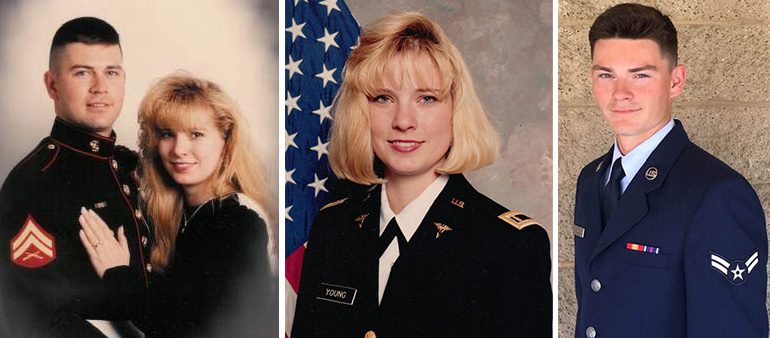June 5, 2020
|
United Brethren pastors were invited to share their church’s plans regarding reopening their church building. They were asked about changes they’ve made in response to the Covid-19 pandemic, and what restrictions they are putting in place upon reopening the building. There were no questions on specific topics—masks, social distancing, nursery, offering, etc.
About 90 pastors responded. The responses were compiled and categorized by Communications director Steve Dennie. This should give you snapshots of what other UB churches are doing, and perhaps give you some ideas as your church shapes its own course.
Bishop Todd Fetters has instructed churches, “Given the fluidity of the information and conditions regarding Covid-19, our local church leadership teams are encouraged to develop flexible plans that also give people the freedom to choose attending or not attending without stigma or shame.”
Seating
Seating, obviously, requires adjustments in the interests of social distancing. How to do that depends on whether you have pews, or moveable chairs.
Ten churches said they will space chairs apart, possibly with various sizes of groupings to accommodate family units (4 chairs, 2 chairs, etc.). One church is moving its service to the gymnasium, where they have room to space chairs six feet apart.
Twelve pastors said they will block off every other pew. One church is designating every other row for the 9:00 service, and the other rows for the 10:30 service.
Five churches are asking families to sit together.
Three churches are dismissing people by row, so that folks don’t bunch up as they leave the sanctuary.
One church took out its pews—which they’d been wanting to do anyway—and replaced them with round tables spaced six feet apart.
Two say they will use ushers to help seat people.
Capacity
Many churches are limiting attendance in some way, either on their own or to meet a state mandate on capacity (50%, 25%, etc.).
Because of the reduced capacity in a service to meet social distancing guidelines, a couple churches are adding more services and/or venues. One church, with only 10 people allowed in the building per service, is doing four consecutive services.
One church is limiting attendance to 40 people, plus 10 volunteers.
One church is asking people to come only once during June.
A couple churches are asking people to register to attend.
One church is offering two services, but the first one will be restricted to vulnerable people, with no kids allowed.
A half-dozen or more churches are doing drive-in services.
Four churches are making services shorter, to allow more time between services or between Sunday school and the service.
An idea from one church: “Started a new service that is the safest we can make it (limited attendance through sign-ups, first service of the weekend, required masks, social distancing, asking people not to sing along with worship). An on-ramp for people to start attending gatherings.”
One church is doing what they call a phased restarting: begin with a shortened service, and add elements as they go.
Sunday School
At least 15 churches said they will eliminate Sunday school for now. One church is moving Sunday school to the sanctuary so they have room for social distancing, as opposed to meeting in smaller classrooms.
Children’s Programming
At least 25 churches have suspended all children’s programming for now. That would include nursery, children’s church, and Sunday school.
One church said they will make the nursery available, but without staff.
One is continuing children’s ministry, but without self-checkin.
Two churches have closed access to the playground.
Distancing/Contact
Over 20 churches said they will encourage social distancing.
Fifteen will forbid shaking hands or hugging.
Only one church said they will check people’s temperature.
Socializing
No surprise: many churches are suspending the greeting or fellowship time as part of the service. One said they are replacing “meet and greet” with “stand and wave.”
One said they will have a “Walmart style” greeter.
One church said the pastor will not greet people after the service.
One will close the lobby and other gathering places, another will forbid gathering after the service, and a third church will forbid socializing in the sanctuary, foyer, and outside steps.
Refreshments
At least a dozen churches are eliminating any food and drinks (coffee, cookies, etc.).
Two churches are making the water fountains off-limits, but one of them will provide bottled water as an alternative.
Printed Materials
A larger number will not distribute the bulletin, but will make it available on a “self-serve” table for those who want a bulletin. Likewise for sermon inserts. Some churches are eliminating the bulletin altogether.
Several mentioned the goal of a “touchless experience” on Sunday morning: nothing to distribute, no Bibles or hymnals to hold, nothing to pass down the rows, no doors to open.
Two churches will forgo passing attendance pads.
Three are removing Bibles and hymnals from the pew racks.
Entrances/Exits
Entrances and exits are chokepoints where social distancing and touch can be easily compromised. Churches are implementing various measures.
Seven churches mentioned propping doors open, so nobody touches door handles or surfaces. Two churches will have a person posted at entry doors to open and close them for people.
Several are designating one entrance and one exit, so traffic flow goes in the same direction. Others are restricting the number of entrance and exit points in some way.
One church is assigning elders to observe people entering for signs of contagion.
Music
Not much was mentioned about music. Two churches said they will limit singing, one will have no singing, and another will use humming instead of singing.
One church is keeping the worship team small and 16 feet from the first row. Another church is using videos instead of a worship team.
Offering
A total of 41 churches said they won’t be passing offering places. Most will use a dropbox or basket somewhere, usually in the back of the church, where people can place their offering.
One church is using offering places, but not passing them. Only ushers will touch the plates.
Communion
As with the offering, many churches will not be passing communion trays—or, in one case, not doing communion at all.
Six churches plan to use prepackaged communion elements.
One church will keep people six feet apart as they come forward to get the elements.
Masks
Six churches are requiring masks. One church will require masks only for age 2 and above.
Thirteen said they will encourage masks, and 11 said they will make masks option.
Nine will provide masks. One will provide several masks in baggies for people who forget to bring one or don’t have one.
One church is encouraging masks “especially for singing.”
Some rules about masks apply to moving around. One church expects people to wear masks to and from their seats. Another encourages masks in hallways and entryways. Two encourage or require masks when moving around the facility.
One church suggests that people remove masks at intervals if they have difficulty breathing.
One church may designate the balcony and narthex as “mask only” locations.
Another church says the pastor and worship leader won’t be required to wear masks while serving in the service.
Building
Some churches are closing off access to parts of the building, to prevent possible contamination and eliminate the need for sanitizing those areas.
Two churches will use only the sanctuary, lobby, and restrooms. Another will close off its upper and lower floors.
One church is closing off the stairways.
One church will turn off the fan and air circulation, while another will open the windows at the door for cross-ventilation.
Bathrooms
Bathrooms can get crowded. One church will limit one person at a time in restrooms (unless it’s a parent and child). Persons using the restroom will need to use disinfectant on whatever they touched while in the restroom.
One church will assign persons to sanitize bathrooms and water fountains after being used. Another has bathroom attendants to guard against crowding and to ensure sanitizing.
Sanitizing
At least a dozen churches mentioned that they will provide sanitizer stations. In reality, most churches will no doubt do this.
One church will require attendees to use hand sanitizer before entering the building.
Two churches will require everyone to use hand sanitizer—in one case, before people even enter the building.
Four churches indicated that they will wipe down surfaces, pews, seats, etc., between services.
Churches are also organizing to do deep cleaning during the week.
Vulnerable People
In many different ways, churches have encouraged various people to stay home for now—if you’re over 65, if you have physical vulnerabilities, if you’re not feeling well, or if you just don’t feel comfortable returning yet.
Said one church: “Anyone who doesn’t feel comfortable returning to corporate worship has the blessing of the board to stay home without any fear of being judged or looked down upon.”
Reopening Date
Churches also indicated when they reopened or plan to reopen. Here are the number of churches which have opened or plan to open on various dates.
1 — March 22
1 — April 5
2 — May 3
8 — May 10
13 — May 17
7 — May 24
12 — May 31
1 — June 1
1 — June 3
13 — June 7
1 — June 13
8 — June 14
1 — June 20
4 — June 21
1 — July 5
1 — July 11
2 — July 12
1 — August 2
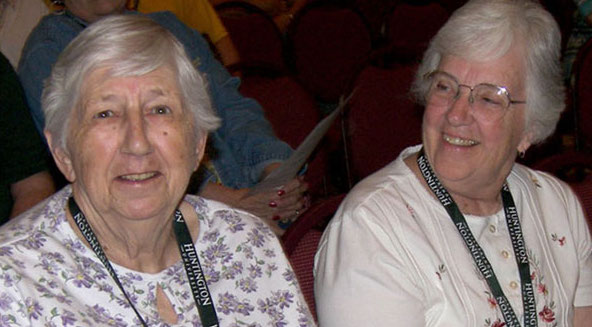

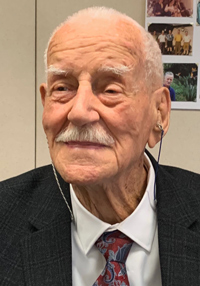
 Donna Hollopeter (right) retired in 2016 after 22 years as associate director of UB Global.
Donna Hollopeter (right) retired in 2016 after 22 years as associate director of UB Global. June L. Brown (right), age 89, of Chambersburg, Pa., passed away on Thursday, June 4, 2020. She served 35 years as a United Brethren missionary in Sierra Leone. Private graveside services will be held at Norland Cemetery in Chambersburg. No other arrangements have been announced at this time.
June L. Brown (right), age 89, of Chambersburg, Pa., passed away on Thursday, June 4, 2020. She served 35 years as a United Brethren missionary in Sierra Leone. Private graveside services will be held at Norland Cemetery in Chambersburg. No other arrangements have been announced at this time. C. Ray Miller chaired the Board of Missions 1965-1993, and was bishop 1973-1993. He and his wife, Lanie, live in Fort Wayne, Ind.
C. Ray Miller chaired the Board of Missions 1965-1993, and was bishop 1973-1993. He and his wife, Lanie, live in Fort Wayne, Ind. Dr. Baker grew up largely in Sierra Leone and attended Centennial Secondary School in Mattru.
Dr. Baker grew up largely in Sierra Leone and attended Centennial Secondary School in Mattru. Tom Datema grew up partly in Sierra Leone as a missionary kid, and later went back as a UB missionary. He is now pastor of the UB church in Zanesville, Ind.
Tom Datema grew up partly in Sierra Leone as a missionary kid, and later went back as a UB missionary. He is now pastor of the UB church in Zanesville, Ind. Miriam and June are among the longest-tenured United Brethren missionaries.
Miriam and June are among the longest-tenured United Brethren missionaries.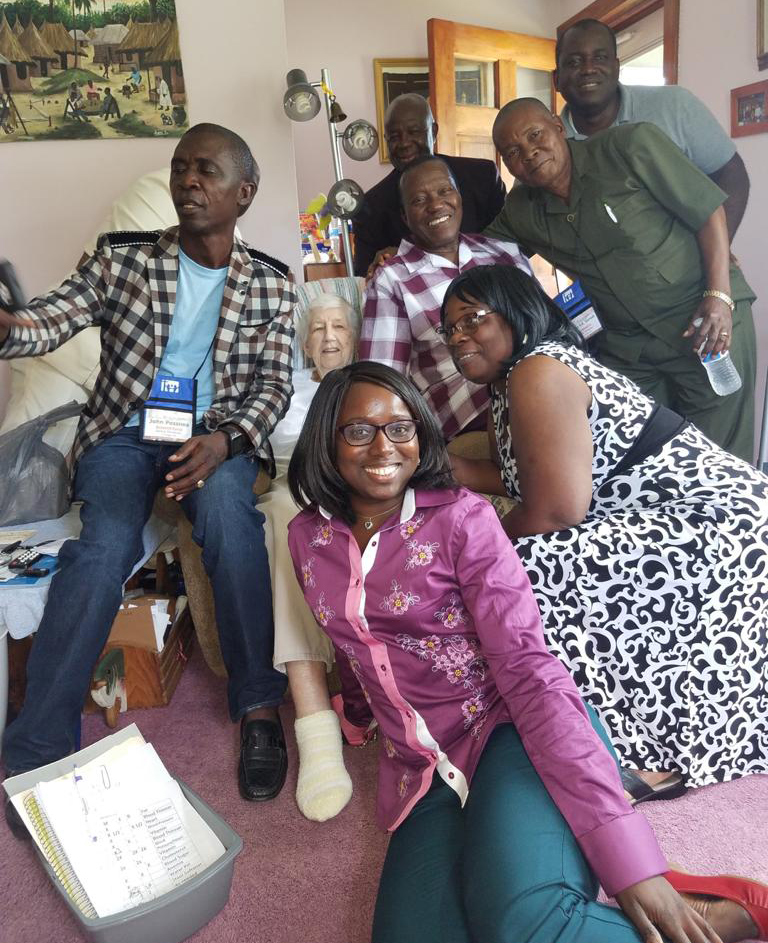
 Dr. Billy Simbo (right) is a native of Sierra Leone, an ordained United Brethren minister, and was the first Sierra Leonean to carry the title of “bishop.” This is written in memory of June Brown, a UB missionary who died on June 4, 2020.
Dr. Billy Simbo (right) is a native of Sierra Leone, an ordained United Brethren minister, and was the first Sierra Leonean to carry the title of “bishop.” This is written in memory of June Brown, a UB missionary who died on June 4, 2020.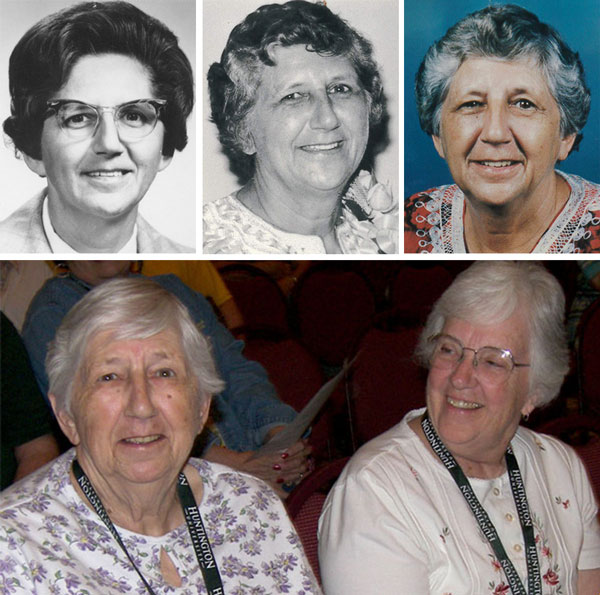
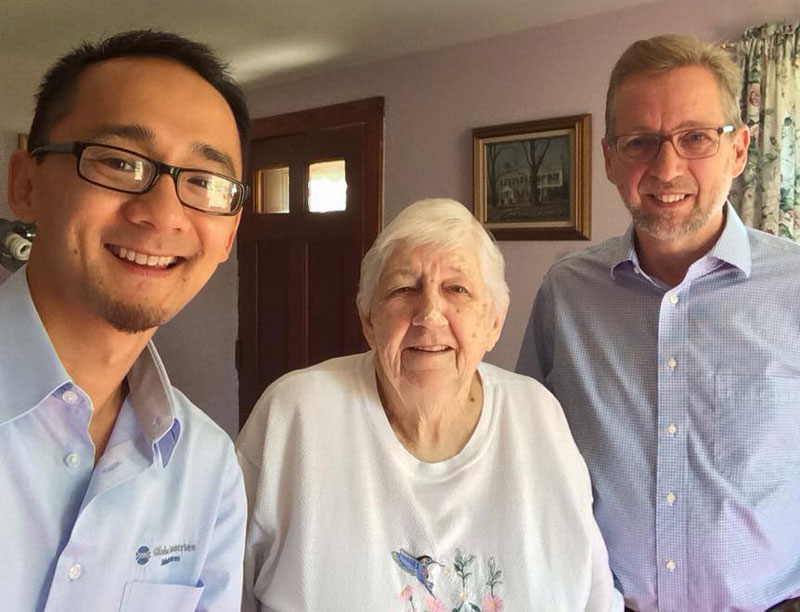
 Todd Fetters (right), Bishop
Todd Fetters (right), Bishop